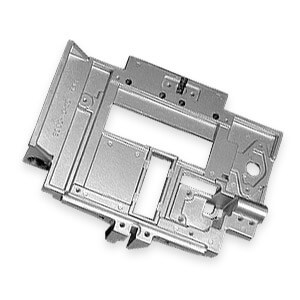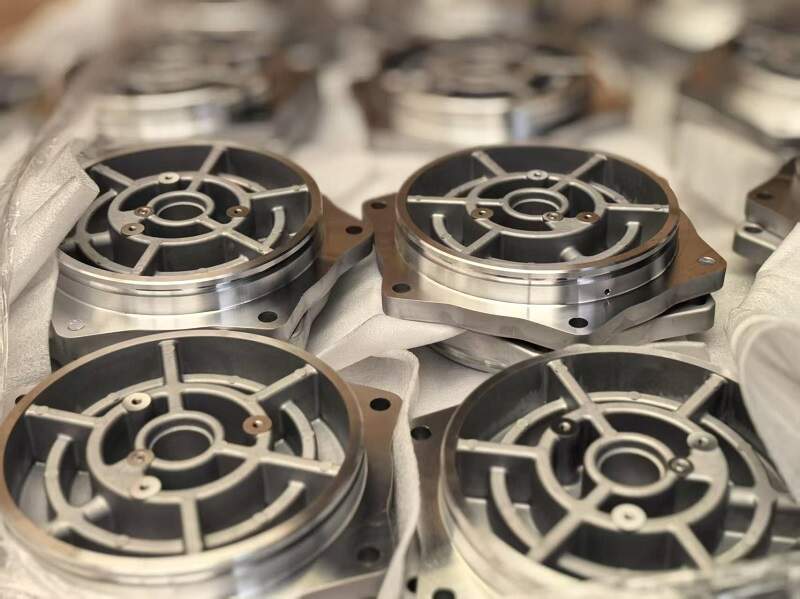The role of an Aluminum Foundry in modern production processes
The Function of Light Weight Aluminum Foundries in Progressing Lightweight Manufacturing Solutions
Aluminum factories considerably add to the advancement of light-weight production services. Their cutting-edge casting innovations generate high-strength, light-weight elements crucial for industries like vehicle and aerospace. This innovation not only improves item performance but likewise advertises sustainability via using recycled materials. As these factories adjust to emerging modern technologies and techniques, they lead the method for future developments in making performance and ecological responsibility. What lies ahead in this transformative trip?
The Benefits of Lightweight Products in Manufacturing
As sectors progressively look for effectiveness and sustainability, the adoption of lightweight products in production has become a necessary strategy - Precision aluminum casting. These products, particularly light weight aluminum and composites, provide various benefits that improve manufacturing processes and product efficiency. Primarily, their decreased weight contributes to reduce energy intake during transport and operation, bring about considerable expense financial savings
Light-weight products help with the style of more complex geometries, allowing for greater innovation in item advancement. This versatility often leads to improved functionality and performance, dealing with the progressing demands of modern consumers.
In addition, the use of lightweight products can enhance the long life of products as a result of their resistance to deterioration and exhaustion. This durability not just lowers maintenance costs yet likewise sustains sustainability initiatives, as longer-lasting products add to less waste. To summarize, the advantages of lightweight products are essential in driving performance, innovation, and environmental responsibility in production.
Innovations in Aluminum Spreading Technologies
Recent developments in aluminum spreading technologies are changing the manufacturing landscape, specifically in the manufacturing of lightweight elements. Technologies such as high-pressure die spreading and vacuum die spreading have actually greatly boosted the precision and surface coating of aluminum components - Aluminum Foundry. These methods allow for the development of intricate geometries while lessening material waste and improving mechanical buildings

Furthermore, the implementation of real-time tracking systems ensures quality assurance throughout the spreading procedure, resulting in even more constant item end results. Jointly, these innovations not only boost the performance of light weight aluminum parts but also support the sector's change towards more lasting manufacturing practices.
Applications of Light Weight Aluminum Components in Numerous Industries
While aluminum elements have long been used in numerous industries, their flexibility and lightweight buildings remain to drive cutting-edge applications throughout markets such as auto, aerospace, and building and construction. In the automobile market, light weight aluminum is increasingly utilized for engine blocks, wheels, and body panels, boosting fuel efficiency and performance. Aerospace suppliers leverage light weight aluminum for airplane frameworks and components, taking advantage of its strength-to-weight proportion to improve gas economic situation and payload capacity.
In the building field, aluminum is favored for home window frameworks, roof covering, and architectural aspects, supplying toughness and resistance to corrosion while minimizing general structure weight. Additionally, the electrical and electronic devices industries benefit from light weight aluminum's conductivity and light-weight nature, using it in electrical wiring, enclosures, and warmth sinks. These varied applications highlight the critical function of aluminum parts, which not just fulfill industry needs yet additionally add to improvements in product layout and functionality throughout several areas.
Sustainability and Energy Effectiveness in Light Weight Aluminum Foundries
The light weight aluminum foundry sector plays a crucial role in promoting sustainability and energy efficiency, especially as need for light-weight elements remains to expand across various sectors. Shops are significantly taking on eco friendly methods, such as utilizing recycled light weight aluminum, which greatly decreases power consumption and greenhouse gas discharges compared to primary light weight aluminum manufacturing.
Moreover, improvements in casting modern technologies enhance power performance by enhancing the melting procedures and lowering waste. Techniques like die spreading and investment casting permit precise product use, minimizing excess and scrap.
In addition, several factories are buying eco-friendly power sources to power procedures, additionally reducing their carbon footprint. Applying energy administration systems allows check my reference factories to monitor and enhance power usage, guaranteeing they run at peak effectiveness.

Future Fads in Lightweight Manufacturing Solutions
How will emerging innovations shape the future of light-weight production services? Advancements such as advanced products, automation, and additive production are readied to redefine manufacturing processes. The integration of wise manufacturing technologies, consisting of the Web of Things (IoT) and artificial intelligence (AI), will certainly enable real-time monitoring and optimization, enhancing effectiveness and decreasing waste.

As sustainability remains to be a paramount issue, lightweight remedies will progressively concentrate on recycling and recycling materials, straightening with circular economic climate concepts. why not check here This advancement in lightweight manufacturing will not only enhance product efficiency yet additionally add to environmental goals, ensuring that the sector remains competitive in a swiftly altering market landscape.
Regularly Asked Concerns
Just How Do Light Weight Aluminum Foundries Ensure Quality Assurance in Production?
Light weight aluminum foundries assure top quality control in manufacturing with strenuous testing, standardized procedures, and constant monitoring - Aluminum Foundry. They apply advanced innovations and knowledgeable personnel to preserve uniformity, minimize issues, and meet industry requirements throughout the manufacturing process
What Are the Key Challenges Encountered by Aluminum Foundries?
Aluminum factories deal with difficulties such as fluctuating basic material costs, maintaining production performance, making sure consistent high quality, adjusting to technical improvements, and conference environmental policies, all of which effect their general functional efficiency and competition on the market.
How Does Light Weight Aluminum Recycling Impact Shop Procedures?
Light weight aluminum recycling substantially enhances foundry operations by lowering raw material prices, decreasing power consumption, and reducing environmental effect. This lasting practice allows shops to improve efficiency while satisfying increasing need for light-weight, high-performance light weight aluminum products.
What Abilities Are Required for Employees in Light Weight Aluminum Foundries?
Employees in aluminum foundries call for abilities in metallurgy, machining, quality assurance, and security techniques. Efficiency in running equipment, understanding alloy residential properties, and analytic are additionally crucial for effective production and maintaining high safety standards.
How Do Aluminum Foundries Take Care Of Waste Administration?
Light weight aluminum shops handle waste with recycling scrap metal, using efficient waste segregation methods, and adhering to ecological guidelines. They apply sustainable practices to minimize land fill contributions, guaranteeing that hazardous products are thrown away properly.
Aluminum shops substantially add to the development of light-weight manufacturing remedies. Current advancements in aluminum spreading innovations are transforming the manufacturing landscape, especially in the manufacturing of light-weight components. While light weight aluminum elements have long been used in various industries, their versatility and light-weight properties continue to drive cutting-edge applications across markets such as auto, aerospace, and building. Furthermore, the electrical and electronics markets profit from aluminum's conductivity and light-weight nature, using it in circuitry, rooms, try here and warm sinks. The aluminum foundry industry plays a vital function in advertising sustainability and energy efficiency, especially as demand for light-weight components continues to grow across various industries.